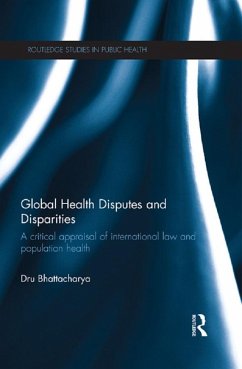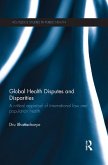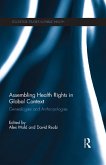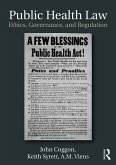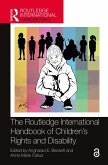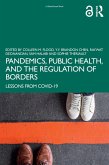Dru Bhattacharya
Global Health Disputes and Disparities (eBook, ePUB)
A Critical Appraisal of International Law and Population Health
47,95 €
47,95 €
inkl. MwSt.
Sofort per Download lieferbar

24 °P sammeln
47,95 €
Als Download kaufen

47,95 €
inkl. MwSt.
Sofort per Download lieferbar

24 °P sammeln
Jetzt verschenken
Alle Infos zum eBook verschenken
47,95 €
inkl. MwSt.
Sofort per Download lieferbar
Alle Infos zum eBook verschenken

24 °P sammeln
Dru Bhattacharya
Global Health Disputes and Disparities (eBook, ePUB)
A Critical Appraisal of International Law and Population Health
- Format: ePub
- Merkliste
- Auf die Merkliste
- Bewerten Bewerten
- Teilen
- Produkt teilen
- Produkterinnerung
- Produkterinnerung

Bitte loggen Sie sich zunächst in Ihr Kundenkonto ein oder registrieren Sie sich bei
bücher.de, um das eBook-Abo tolino select nutzen zu können.
Hier können Sie sich einloggen
Hier können Sie sich einloggen
Sie sind bereits eingeloggt. Klicken Sie auf 2. tolino select Abo, um fortzufahren.

Bitte loggen Sie sich zunächst in Ihr Kundenkonto ein oder registrieren Sie sich bei bücher.de, um das eBook-Abo tolino select nutzen zu können.
Global Health Disputes and Disparities explores inequalities in health around the world, looking particularly at the role of national, regional, and international tribunals who have taken a proactive role in addressing health-related human rights abuses.
- Geräte: eReader
- mit Kopierschutz
- eBook Hilfe
- Größe: 1.97MB
Andere Kunden interessierten sich auch für
![Global Health Disputes and Disparities (eBook, PDF) Global Health Disputes and Disparities (eBook, PDF)]() Dru BhattacharyaGlobal Health Disputes and Disparities (eBook, PDF)47,95 €
Dru BhattacharyaGlobal Health Disputes and Disparities (eBook, PDF)47,95 €![Assembling Health Rights in Global Context (eBook, ePUB) Assembling Health Rights in Global Context (eBook, ePUB)]() Assembling Health Rights in Global Context (eBook, ePUB)34,95 €
Assembling Health Rights in Global Context (eBook, ePUB)34,95 €![Public Health Law (eBook, ePUB) Public Health Law (eBook, ePUB)]() John CoggonPublic Health Law (eBook, ePUB)54,95 €
John CoggonPublic Health Law (eBook, ePUB)54,95 €![Confidentiality, Privacy, and Data Protection in Biomedicine (eBook, ePUB) Confidentiality, Privacy, and Data Protection in Biomedicine (eBook, ePUB)]() Confidentiality, Privacy, and Data Protection in Biomedicine (eBook, ePUB)49,95 €
Confidentiality, Privacy, and Data Protection in Biomedicine (eBook, ePUB)49,95 €![The Routledge International Handbook of Children's Rights and Disability (eBook, ePUB) The Routledge International Handbook of Children's Rights and Disability (eBook, ePUB)]() The Routledge International Handbook of Children's Rights and Disability (eBook, ePUB)46,95 €
The Routledge International Handbook of Children's Rights and Disability (eBook, ePUB)46,95 €![Pandemics, Public Health, and the Regulation of Borders (eBook, ePUB) Pandemics, Public Health, and the Regulation of Borders (eBook, ePUB)]() Pandemics, Public Health, and the Regulation of Borders (eBook, ePUB)0,00 €
Pandemics, Public Health, and the Regulation of Borders (eBook, ePUB)0,00 €![Outsmarting the Next Pandemic (eBook, ePUB) Outsmarting the Next Pandemic (eBook, ePUB)]() Outsmarting the Next Pandemic (eBook, ePUB)41,95 €
Outsmarting the Next Pandemic (eBook, ePUB)41,95 €-
-
-
Global Health Disputes and Disparities explores inequalities in health around the world, looking particularly at the role of national, regional, and international tribunals who have taken a proactive role in addressing health-related human rights abuses.
Dieser Download kann aus rechtlichen Gründen nur mit Rechnungsadresse in A, B, BG, CY, CZ, D, DK, EW, E, FIN, F, GR, HR, H, IRL, I, LT, L, LR, M, NL, PL, P, R, S, SLO, SK ausgeliefert werden.
Produktdetails
- Produktdetails
- Verlag: Taylor & Francis eBooks
- Seitenzahl: 184
- Erscheinungstermin: 7. Dezember 2012
- Englisch
- ISBN-13: 9781136170409
- Artikelnr.: 38256057
- Verlag: Taylor & Francis eBooks
- Seitenzahl: 184
- Erscheinungstermin: 7. Dezember 2012
- Englisch
- ISBN-13: 9781136170409
- Artikelnr.: 38256057
- Herstellerkennzeichnung Die Herstellerinformationen sind derzeit nicht verfügbar.
Dhrubajyoti (Dru) Bhattacharya is the Director of the Health Policy track in the Master of Public Health program at Loyola University Chicago, Assistant Professor of Health Policy at Loyola University Chicago Stritch School of Medicine, and Visiting Professor of Law at Loyola University Chicago School of Law, USA.
I. Introduction to International Law and Global Health II. A Critical
Assessment of Treaty-Monitoring Bodies: A Case-Study of CEDAW's Optional
Protocol Introduction I. Proposed Legal Framework for Considering a
Communication A. Parsing Individual and Structural Conceptions of Remedies
B. Form and Substance of Committee Review and Deliberations C. On The
Nature and Scope of General Recommendations II. Examining the Optional
Protocol in Practice A. Review of the Allegations, Violations, and Reasons
Employed B. Interpretive Trends and the Utility of the Proposed Legal
Framework C. Applying the Framework to a Health-Related Claim: Abortion
III. Conclusion III. Perspectives from the Field: A Conversation with
George Annas, J.D., M.P.H., Chair, Health Law, Bioethics & Human Rights;
William Fairfield Warren Distinguished Professor IV. At the Intersection of
Law, Human Rights, and Religion: A Case-Study in Female Autonomy in
Hinduism and Islam Introduction I. Trends in Unsafe Abortions and Female
Decision-Making Capacity A. Public Health Burden and Impact on Women in
India B. Public Health Burden and Impact on Women in Pakistan II. Legal
Instruments and Derogation from Human Rights Obligations A. Declarations
and Reservations to CEDAW B. Indian Unconstitutional Agenda Furthered by
Conflicting Laws & Rulings C. Pervasive Problems Amidst an Incoherent Legal
Framework in Pakistan III. Reconciling Human Rights, Religion, and Social
Justice A. Muddupalani's Radhika Santawanam and [Post] Colonial Patriarch
B. The Parameters of Female Autonomy and Sexuality in Foundational Texts:
The Mahabharata C. The Principle of Awliyah and the Exercise of Female
Autonomy D. Utilizing Religion to Promote Human Rights and Functional
Capabilities IV. Recommendations for Ethical, Legal and Structural Reform
V. Conclusion V. Perspectives from the Field: A Conversation with Benjamin
Meier, Ph.D., J.D., LL.M., Assistant Professor of Global Health Policy at
the University of North Carolina-Chapel Hill VI. Trade and Health: Emergent
Paradigms and Case-Studies in Infectious Diseases an Emerging Paradigm
Shift I. Indonesia's Withdrawal of H1N1 Viral Samples A. Conceptual Fallacy
of the Most Stable Nation Status B. An Overview of the Declaration on the
TRIPS Agreement and the IHR II. Securing Global Health Interests Cannot be
Traced to the Doha Declaration or the IHR A. Focus Box 1. HIV/AIDS and
Access: The South African Experience B. The Doha Declaration and Public
Health Emergencies C. Npis are not a Long-Term Solution to Contain
Infectious Diseases D. Focus Box 2. SARS and XDR-TB - International and
National Responses III. State Epidemic Control and Use of Biological
Materials A. Withholding Viral Strains is in Potential Contravention to a
State's Obligations Under the IHR in Taking Measures to Control Epidemics
B. State Control of Biological Materials is an Invalid Proxy for Individual
Rights and is Superseded by Public Health Imperatives C. The Principle of
Awliyah and the Exercise of Female Autonomy D. Utilizing Religion to
Promote Human Rights and Functional Capabilities IV. Conclusion VII.
Perspectives from the Field: A Conversation with Kayhan Parsi, Ph.D., J.D.,
Associate Professor of Bioethics and Health Policy, Loyola University
Chicago VIII. Epidemiology and the Challenge of Regulating Social
Determinants of Health IX. Perspectives from the Field: A Conversation with
John Kraemer, J.D., M.P.H., Assistant Professor, Georgetown University,
Washington, D.C.
Assessment of Treaty-Monitoring Bodies: A Case-Study of CEDAW's Optional
Protocol Introduction I. Proposed Legal Framework for Considering a
Communication A. Parsing Individual and Structural Conceptions of Remedies
B. Form and Substance of Committee Review and Deliberations C. On The
Nature and Scope of General Recommendations II. Examining the Optional
Protocol in Practice A. Review of the Allegations, Violations, and Reasons
Employed B. Interpretive Trends and the Utility of the Proposed Legal
Framework C. Applying the Framework to a Health-Related Claim: Abortion
III. Conclusion III. Perspectives from the Field: A Conversation with
George Annas, J.D., M.P.H., Chair, Health Law, Bioethics & Human Rights;
William Fairfield Warren Distinguished Professor IV. At the Intersection of
Law, Human Rights, and Religion: A Case-Study in Female Autonomy in
Hinduism and Islam Introduction I. Trends in Unsafe Abortions and Female
Decision-Making Capacity A. Public Health Burden and Impact on Women in
India B. Public Health Burden and Impact on Women in Pakistan II. Legal
Instruments and Derogation from Human Rights Obligations A. Declarations
and Reservations to CEDAW B. Indian Unconstitutional Agenda Furthered by
Conflicting Laws & Rulings C. Pervasive Problems Amidst an Incoherent Legal
Framework in Pakistan III. Reconciling Human Rights, Religion, and Social
Justice A. Muddupalani's Radhika Santawanam and [Post] Colonial Patriarch
B. The Parameters of Female Autonomy and Sexuality in Foundational Texts:
The Mahabharata C. The Principle of Awliyah and the Exercise of Female
Autonomy D. Utilizing Religion to Promote Human Rights and Functional
Capabilities IV. Recommendations for Ethical, Legal and Structural Reform
V. Conclusion V. Perspectives from the Field: A Conversation with Benjamin
Meier, Ph.D., J.D., LL.M., Assistant Professor of Global Health Policy at
the University of North Carolina-Chapel Hill VI. Trade and Health: Emergent
Paradigms and Case-Studies in Infectious Diseases an Emerging Paradigm
Shift I. Indonesia's Withdrawal of H1N1 Viral Samples A. Conceptual Fallacy
of the Most Stable Nation Status B. An Overview of the Declaration on the
TRIPS Agreement and the IHR II. Securing Global Health Interests Cannot be
Traced to the Doha Declaration or the IHR A. Focus Box 1. HIV/AIDS and
Access: The South African Experience B. The Doha Declaration and Public
Health Emergencies C. Npis are not a Long-Term Solution to Contain
Infectious Diseases D. Focus Box 2. SARS and XDR-TB - International and
National Responses III. State Epidemic Control and Use of Biological
Materials A. Withholding Viral Strains is in Potential Contravention to a
State's Obligations Under the IHR in Taking Measures to Control Epidemics
B. State Control of Biological Materials is an Invalid Proxy for Individual
Rights and is Superseded by Public Health Imperatives C. The Principle of
Awliyah and the Exercise of Female Autonomy D. Utilizing Religion to
Promote Human Rights and Functional Capabilities IV. Conclusion VII.
Perspectives from the Field: A Conversation with Kayhan Parsi, Ph.D., J.D.,
Associate Professor of Bioethics and Health Policy, Loyola University
Chicago VIII. Epidemiology and the Challenge of Regulating Social
Determinants of Health IX. Perspectives from the Field: A Conversation with
John Kraemer, J.D., M.P.H., Assistant Professor, Georgetown University,
Washington, D.C.
I. Introduction to International Law and Global Health II. A Critical
Assessment of Treaty-Monitoring Bodies: A Case-Study of CEDAW's Optional
Protocol Introduction I. Proposed Legal Framework for Considering a
Communication A. Parsing Individual and Structural Conceptions of Remedies
B. Form and Substance of Committee Review and Deliberations C. On The
Nature and Scope of General Recommendations II. Examining the Optional
Protocol in Practice A. Review of the Allegations, Violations, and Reasons
Employed B. Interpretive Trends and the Utility of the Proposed Legal
Framework C. Applying the Framework to a Health-Related Claim: Abortion
III. Conclusion III. Perspectives from the Field: A Conversation with
George Annas, J.D., M.P.H., Chair, Health Law, Bioethics & Human Rights;
William Fairfield Warren Distinguished Professor IV. At the Intersection of
Law, Human Rights, and Religion: A Case-Study in Female Autonomy in
Hinduism and Islam Introduction I. Trends in Unsafe Abortions and Female
Decision-Making Capacity A. Public Health Burden and Impact on Women in
India B. Public Health Burden and Impact on Women in Pakistan II. Legal
Instruments and Derogation from Human Rights Obligations A. Declarations
and Reservations to CEDAW B. Indian Unconstitutional Agenda Furthered by
Conflicting Laws & Rulings C. Pervasive Problems Amidst an Incoherent Legal
Framework in Pakistan III. Reconciling Human Rights, Religion, and Social
Justice A. Muddupalani's Radhika Santawanam and [Post] Colonial Patriarch
B. The Parameters of Female Autonomy and Sexuality in Foundational Texts:
The Mahabharata C. The Principle of Awliyah and the Exercise of Female
Autonomy D. Utilizing Religion to Promote Human Rights and Functional
Capabilities IV. Recommendations for Ethical, Legal and Structural Reform
V. Conclusion V. Perspectives from the Field: A Conversation with Benjamin
Meier, Ph.D., J.D., LL.M., Assistant Professor of Global Health Policy at
the University of North Carolina-Chapel Hill VI. Trade and Health: Emergent
Paradigms and Case-Studies in Infectious Diseases an Emerging Paradigm
Shift I. Indonesia's Withdrawal of H1N1 Viral Samples A. Conceptual Fallacy
of the Most Stable Nation Status B. An Overview of the Declaration on the
TRIPS Agreement and the IHR II. Securing Global Health Interests Cannot be
Traced to the Doha Declaration or the IHR A. Focus Box 1. HIV/AIDS and
Access: The South African Experience B. The Doha Declaration and Public
Health Emergencies C. Npis are not a Long-Term Solution to Contain
Infectious Diseases D. Focus Box 2. SARS and XDR-TB - International and
National Responses III. State Epidemic Control and Use of Biological
Materials A. Withholding Viral Strains is in Potential Contravention to a
State's Obligations Under the IHR in Taking Measures to Control Epidemics
B. State Control of Biological Materials is an Invalid Proxy for Individual
Rights and is Superseded by Public Health Imperatives C. The Principle of
Awliyah and the Exercise of Female Autonomy D. Utilizing Religion to
Promote Human Rights and Functional Capabilities IV. Conclusion VII.
Perspectives from the Field: A Conversation with Kayhan Parsi, Ph.D., J.D.,
Associate Professor of Bioethics and Health Policy, Loyola University
Chicago VIII. Epidemiology and the Challenge of Regulating Social
Determinants of Health IX. Perspectives from the Field: A Conversation with
John Kraemer, J.D., M.P.H., Assistant Professor, Georgetown University,
Washington, D.C.
Assessment of Treaty-Monitoring Bodies: A Case-Study of CEDAW's Optional
Protocol Introduction I. Proposed Legal Framework for Considering a
Communication A. Parsing Individual and Structural Conceptions of Remedies
B. Form and Substance of Committee Review and Deliberations C. On The
Nature and Scope of General Recommendations II. Examining the Optional
Protocol in Practice A. Review of the Allegations, Violations, and Reasons
Employed B. Interpretive Trends and the Utility of the Proposed Legal
Framework C. Applying the Framework to a Health-Related Claim: Abortion
III. Conclusion III. Perspectives from the Field: A Conversation with
George Annas, J.D., M.P.H., Chair, Health Law, Bioethics & Human Rights;
William Fairfield Warren Distinguished Professor IV. At the Intersection of
Law, Human Rights, and Religion: A Case-Study in Female Autonomy in
Hinduism and Islam Introduction I. Trends in Unsafe Abortions and Female
Decision-Making Capacity A. Public Health Burden and Impact on Women in
India B. Public Health Burden and Impact on Women in Pakistan II. Legal
Instruments and Derogation from Human Rights Obligations A. Declarations
and Reservations to CEDAW B. Indian Unconstitutional Agenda Furthered by
Conflicting Laws & Rulings C. Pervasive Problems Amidst an Incoherent Legal
Framework in Pakistan III. Reconciling Human Rights, Religion, and Social
Justice A. Muddupalani's Radhika Santawanam and [Post] Colonial Patriarch
B. The Parameters of Female Autonomy and Sexuality in Foundational Texts:
The Mahabharata C. The Principle of Awliyah and the Exercise of Female
Autonomy D. Utilizing Religion to Promote Human Rights and Functional
Capabilities IV. Recommendations for Ethical, Legal and Structural Reform
V. Conclusion V. Perspectives from the Field: A Conversation with Benjamin
Meier, Ph.D., J.D., LL.M., Assistant Professor of Global Health Policy at
the University of North Carolina-Chapel Hill VI. Trade and Health: Emergent
Paradigms and Case-Studies in Infectious Diseases an Emerging Paradigm
Shift I. Indonesia's Withdrawal of H1N1 Viral Samples A. Conceptual Fallacy
of the Most Stable Nation Status B. An Overview of the Declaration on the
TRIPS Agreement and the IHR II. Securing Global Health Interests Cannot be
Traced to the Doha Declaration or the IHR A. Focus Box 1. HIV/AIDS and
Access: The South African Experience B. The Doha Declaration and Public
Health Emergencies C. Npis are not a Long-Term Solution to Contain
Infectious Diseases D. Focus Box 2. SARS and XDR-TB - International and
National Responses III. State Epidemic Control and Use of Biological
Materials A. Withholding Viral Strains is in Potential Contravention to a
State's Obligations Under the IHR in Taking Measures to Control Epidemics
B. State Control of Biological Materials is an Invalid Proxy for Individual
Rights and is Superseded by Public Health Imperatives C. The Principle of
Awliyah and the Exercise of Female Autonomy D. Utilizing Religion to
Promote Human Rights and Functional Capabilities IV. Conclusion VII.
Perspectives from the Field: A Conversation with Kayhan Parsi, Ph.D., J.D.,
Associate Professor of Bioethics and Health Policy, Loyola University
Chicago VIII. Epidemiology and the Challenge of Regulating Social
Determinants of Health IX. Perspectives from the Field: A Conversation with
John Kraemer, J.D., M.P.H., Assistant Professor, Georgetown University,
Washington, D.C.
